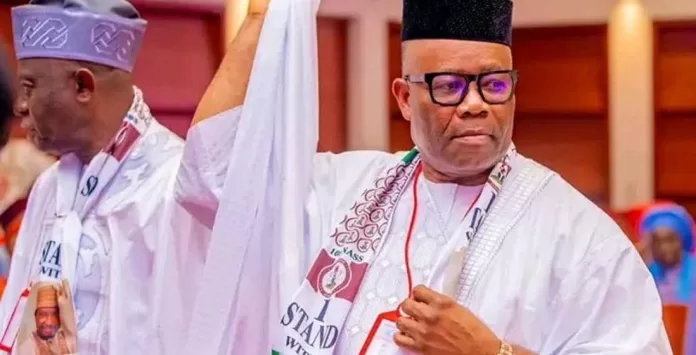In the realm a Nigerian politics under Akpabio, moments of controversy often spark heated discussions. Recently, social media platforms have become arenas where public figures face intense scrutiny. One such incident revolves around Senate President Akpabio‘s comments during the funeral of the revered businessman and philanthropist, Wigwe. This article delves into the aftermath of Akpabio’s remarks, dissecting the public’s reaction and the broader implications for political discourse in Nigeria.
Overview of the Incident
Wigwe’s funeral, a somber occasion attended by dignitaries across various sectors, took an unexpected turn with Akpabio’s remarks. What should have been a moment of reverence and reflection turned into a spectacle of controversy. Akpabio’s words, deemed insensitive and out of touch, ignited a firestorm of criticism on social media, particularly Twitter.
Senate President Akpabio Remarks
Akpabio’s comments, characterized by their lack of empathy and decorum, struck a nerve with Nigerians across the country. His tone-deaf remarks at a solemn event such as Wigwe’s funeral were met with swift condemnation online. Twitter users, in particular, were vocal in expressing their outrage, highlighting the disconnect between political elites and the general populace.
Analysis of Criticisms
The backlash against Akpabio’s remarks underscores the power of social media in holding public figures accountable. It serves as a reminder of the responsibility that comes with holding positions of power and influence. Politicians must be mindful of their words and actions, especially in moments of national mourning, to avoid alienating the very people they are meant to serve.
Response from Akpabio’s Camp
In the face of mounting criticism, Akpabio’s camp attempted to downplay the significance of his remarks. However, their explanations fell short of quelling the public’s outrage. Many saw them as feeble attempts to deflect responsibility rather than genuine efforts to address the harm caused by the comments. The lack of a sincere apology only served to further fuel the controversy.
Importance of Political Rhetoric
The incident serves as a poignant reminder of the impact that political rhetoric can have on public perception. Elected officials wield considerable influence through their words, and they must exercise caution to avoid causing unnecessary harm. Akpabio’s misstep highlights the need for leaders to prioritize empathy and sensitivity in their communication with the public.
Cultural Sensitivity and Political Discourse
At its core, the controversy surrounding Akpabio’s remarks raises questions about cultural sensitivity and the boundaries of acceptable discourse in Nigerian politics. While freedom of speech is a fundamental right, it must be tempered with an understanding of the diverse cultural norms and sensitivities of the Nigerian populace. Failure to do so risks further widening the rift between political leaders and the people they represent.
Calls for Accountability
In the wake of the incident, there have been growing calls for accountability within Nigeria’s political establishment. Twitter users and activists alike have demanded that Akpabio take responsibility for his words and issue a formal apology. The episode has reignited conversations about the need for transparency, integrity, and ethical leadership in Nigerian politics.
Solidarity Among Nigerian Twitter Users
Despite the divisive nature of Nigerian politics, the incident has fostered a sense of solidarity among Twitter users. Across ethnic, religious, and socio-economic divides, Nigerians have united in their condemnation of Akpabio’s remarks. This collective outrage underscores the shared desire for accountability and ethical governance within the country.
Reflection on Political Leadership
Ultimately, the controversy surrounding Akpabio’s remarks prompts a broader reflection on the state of political leadership in Nigeria. It serves as a wake-up call for politicians to reevaluate their approach to public communication and engagement. The Nigerian people deserve leaders who embody the values of empathy, integrity, and respect for all citizens.
Impact on National Dialogue
The fallout from the incident has reverberated throughout Nigeria’s national dialogue, sparking conversations about the role of political leaders in shaping public discourse. It serves as a stark reminder of the power dynamics at play in Nigerian society and the need for greater accountability from those in positions of authority.
Role of Social Media in Political Critique
Lastly, the episode underscores the growing influence of social media as a platform for political critique and activism. Nigerian Twitter users have leveraged their collective voice to hold leaders accountable and demand change. This highlights the democratizing potential of digital communication in shaping the country’s political landscape.
Conclusion
The controversy surrounding Senate President Akpabio’s remarks at Wigwe’s funeral has ignited a national conversation about the conduct of political leaders and the boundaries of acceptable discourse. It underscores the importance of ethical leadership, cultural sensitivity, and accountability within Nigeria’s political establishment. Moving forward, it is imperative that elected officials listen to the voices of their constituents and strive to uphold the principles of dignity, respect, and integrity.
FAQs
- Why were Akpabio’s remarks criticized? Akpabio’s remarks were criticized for being insensitive and inappropriate, particularly given the solemnity of the occasion.
- Has Akpabio apologized for his comments? As of now, Akpabio has not issued a formal apology for his remarks, despite widespread condemnation.
- What are the broader implications of this incident? The incident highlights broader issues regarding political leadership, accountability, and the role of social media in shaping public discourse.
- How has the public responded to Akpabio’s remarks? The public response has been overwhelmingly negative, with thousands of Nigerians expressing outrage and demanding accountability from Akpabio.
- What steps can be taken to prevent similar incidents in the future? Elected officials must prioritize cultural sensitivity, empathy, and integrity in their public statements to avoid causing harm and eroding public trust.



